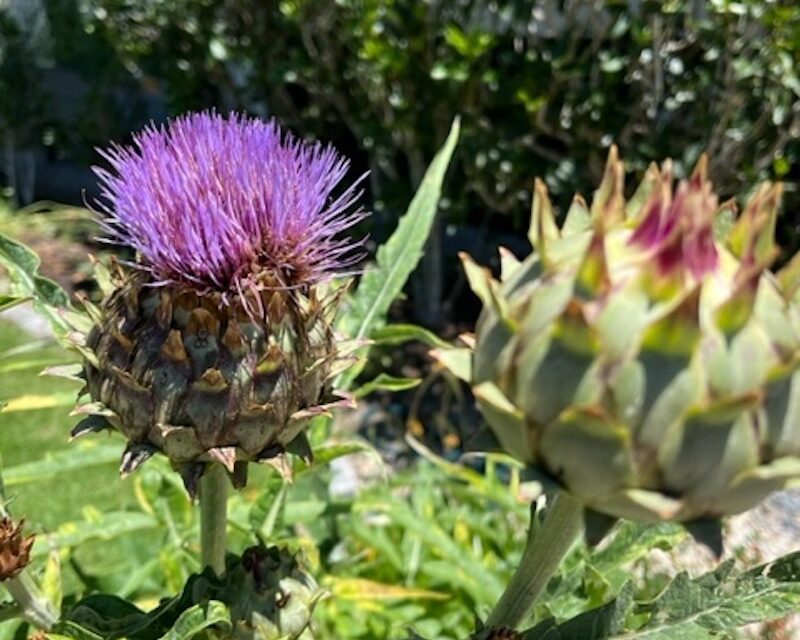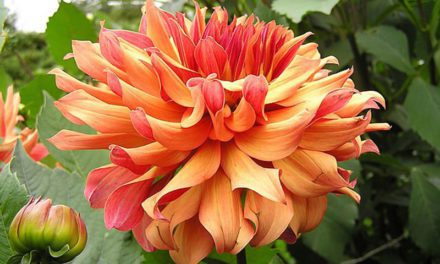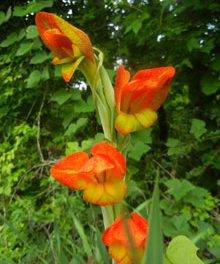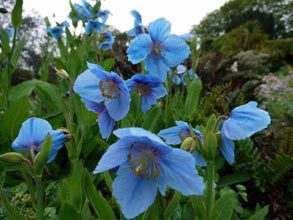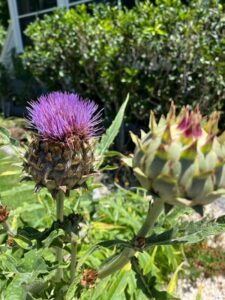
Cardoon
And I do not mean Christmas. From the beginning of April into the middle of May is perfect here for Lowcountry gardeners. Garden centers are full of annuals and perennials, online nurseries are sending out boxes of their wares, and I am continually washing my clothes to get the dirt off. And best of all, the real heat and humidity of the summer has not set in – yet.
What am are some good perennials to plant during this time of the year?
You cannot go wrong with Salvias – deer resistant, long lived, and long blooming. You also cannot go wrong with the two classics, “Black and Bloom” Salvia and Amistad Salvia. Amistad was developed by an Argentinian grower and is also known as “Friendship Sage” since Amistad means friendship in Spanish. It has large dark purple blossoms and blooms for a long time. There are many types of Salvias, literally hundreds of varieties and cultivars. The color ranges are quite diverse with red, pink, blue, andpurple, with shades in between. “Mystic spires” is a compact version in a beautiful indigo blue or purple. Butterflies and hummingbirds are known to love Salvias.
Another great deer resistant plant is Baptisia or false indigo. It is native to the Southeast and I have the Baptisia australis (bluish purple) and Baptisia “Carolina Moonlight” (yellow). Baptisia is a spring bloomer here and the foliage lasts until July and fades away.I always forget where I plant it and this year I found that I had placed a bird bath over one plant. It came up from under the bird bath – tough little thing.
Coneflowers are an easy to find perennial that is native to our American prairies. The flowers are large and daisy like. The original native had pink flowers, but new cultivars are red, yellow, and hotter shades of pink than the original. Coneflowers are very hardy through our winters. The only disadvantage is that they tend to be short lived perennials and after about five years, they get smaller and more insignificant. I am replacing mine this year because they are just not worth the space in my garden.Perennials are not truly perennial. Some may last ten years, but some may diminish after only five years. The plants that seem to be perennial and last for years are probably the offspring of the original plant in your garden.
Cardoon (Cynara cardunculus) is a great garden plant grown for its foliage as much as for the flowers which start out looking like an artichoke and then open into a purple thistle. The gray-green spiky leaves are a great addition to any garden. Since it is a Mediterranean plant, Cardoon does not have big water needs. Cardoons were cultivated in Italy to make the modern edible globe artichoke. The plant may die after blooming or it might resprout. It is easy to grow from seeds.
Another great foliage plant is bronze fennel. The seeds are used to flavor Italian dishes such as sausages. They have a licorice–like taste. Fennels have tall dark stalks with lacy feathery leaves. The only other thing that looks like them is dill, another fun foliage plant that you can also use for cooking. Fennel is loved by swallowtail caterpillars. They will strip the leaves right from the plant if they find it. I don’t mind because that is one reason why I have a garden – to attract pollinators. Fennel might look strange without leaves, but they will come back next spring.
Did you know that yellow is the least favorite flower color of professional garden designers? I have no idea why because I love to see a pop of yellow in a garden. Yellow leafed shrubs such as “Sunshine” Ligustrum, Duranta, or “Florida Sunshine” Anise can give year around color in a landscape. A great garden perennial is good old fashioned black-eyed susans or Rudbeckia. There are many varieties of Rudbeckia with different sized flower heads. There is even a perennial Rudbeckia (Rudbeckia fulgida) and an annual version that does tend to reseed (Rudbeckia hirta). Rudbeckias are native to North America and a welcome early spring flower.
All these plants like full sun and do well with an occasional drink of water, but they are not water hogs. I mulch them with mushroom compost which give them nutrients as well as keeps moisture in. You will find all these perennials at local garden centers so shop until you drop. You will be rewarded with flowers and the pollinators will be happy.

